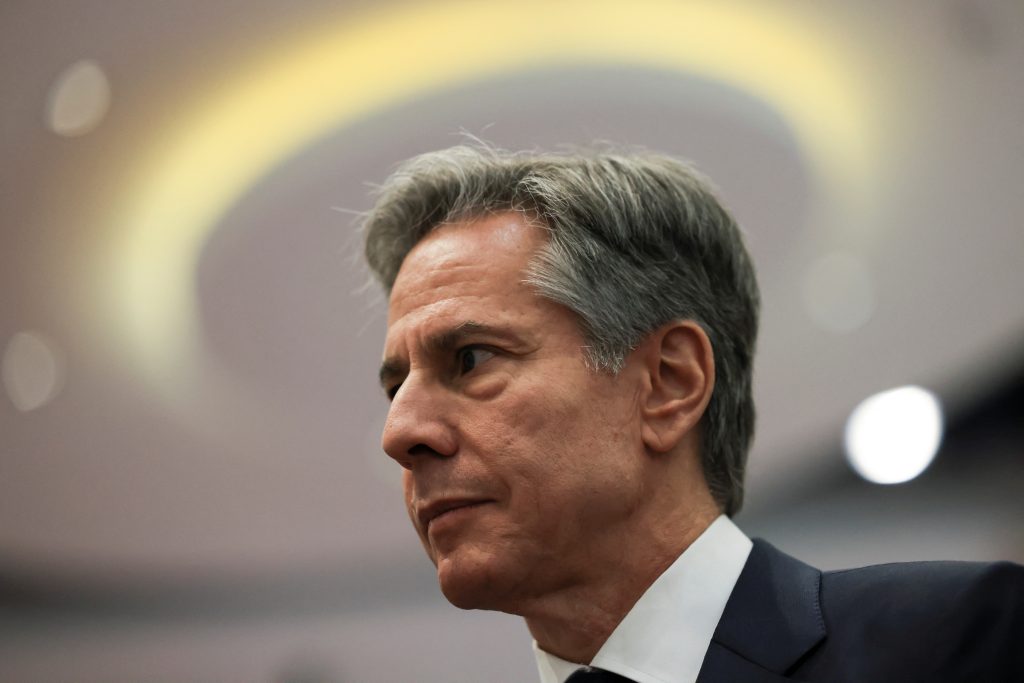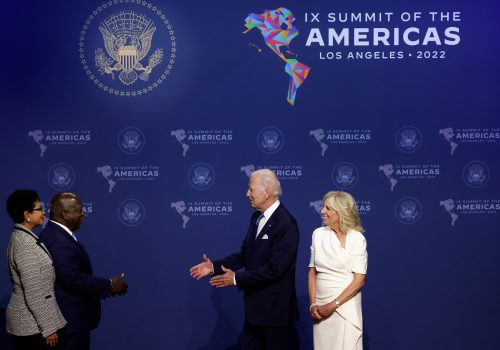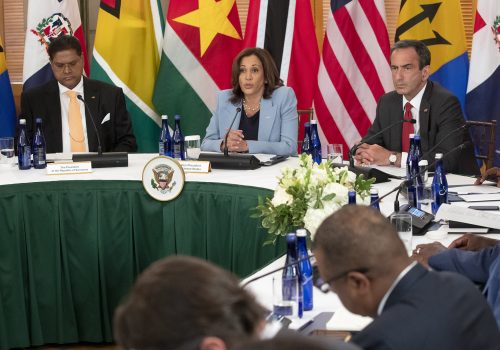US Secretary of State Antony Blinken’s trip to the Caribbean cannot be a wasted opportunity. The July 5-6 trip begins in Trinidad and Tobago—where heads of government and state will gather for the fiftieth anniversary of the Caribbean Community’s (CARICOM) formation—and ends in Guyana. On the surface, this is a win for US-Caribbean relations, as it comes off the back of several high-level US visits to the region.
In the past twelve months, Vice President Kamala Harris launched the US-Caribbean Partnership to Address the Climate Crisis 2030, welcomed leaders to Washington, and met in person with leaders in The Bahamas. This has helped build goodwill in the region. But US visits and diplomatic engagement have yet to yield many results. Simply put, if Blinken arrives in the Caribbean with little to announce, frustration is likely to brew.
Blinken’s visit must start an action-oriented agenda for the region. He should focus on two key areas of cooperation. First, the United States should work with multilateral development banks (MDBs) to provide access to low-cost and low-interest financing to high- and middle-income Caribbean countries. Second, Washington should provide requisite tools to local private sector businesses so they can play a larger role in the region’s own development.
For the United States, the consequences of insufficient action so far are evident. Given the enormity of the challenges facing the Caribbean, the region’s leaders are seeking solutions to their problems elsewhere. Barbadian Prime Minister Mia Mottley has taken to the global stage to overhaul MDB financing, Guyana is welcoming investment in its oil sector from all corners of the world, and Trinidad and Tobago is increasing engagement with Venezuela over shared gas reserves. Other Caribbean leaders see African countries, India, and China as attractive partners that can provide financing, investment, and aid.
This does not mean that US presence in the region will evaporate. The Caribbean’s proximity to the United States, strong trade relations, and a large US-based diaspora ties the partners together. But US government officials must realize that the United States will no longer be the only actor with which Caribbean leaders will engage. Therefore, if the United States wants to remain relevant in the region, now is the moment to deliver real solutions to the challenges facing its Caribbean neighbors.
A plan to amplify financial instruments
The first step should be working with MDBs, such as the World Bank and the Inter-American Development Bank, to amplify new financial instruments to support access to concessional financing for Caribbean countries. Most Caribbean countries are classified as high- or middle-income, which means that they are not able to access low-cost and low-interest financing from MDBs to fund needed infrastructure or social programs in times of crisis. Part of this work is ongoing, with the World Bank recently announcing a debt pause on loan repayments for developing countries hit by natural disasters.
However, the pause only applies to new loans, not existing ones. Given the specific vulnerabilities of Caribbean countries, which extend beyond just the effects of climate change–induced events, the United States should work with MDBs to create a specific carve-out for small island development states such as the CARICOM countries. Hurricanes and other natural disasters pose significant risks to the Caribbean. But due to the small size and openness of their economies, so do other external events, such as pandemics, the volatility of commodity prices, and disruptions in supply chains. These external risks should be accounted for as well, because if another COVID-19 pandemic occurred today, Caribbean countries would still be on the hook for loan repayments.
Charging up the private sector
The United States should also work closer with local businesses to embolden the Caribbean private sector. Big infrastructure projects in the Caribbean, such as roads, bridges, and new buildings, are mostly led by governments. The private sector is often left out, as local banks provide only limited financing or loans with high interest rates. This creates a vast asymmetry between government and private sector resources, with governments scoring political points from new infrastructure projects, while the skills, expertise, and capital that bring these projects to fruition result in little benefit for local companies. Foreign companies, therefore, reap the benefits, with returns on projects benefitting external actors rather than populations in the Caribbean, including the business community. This creates a dependency on the state to provide jobs, resources, and skills to citizens, meaning that the distribution of these resources is tied to the government of the day.
To address this, the United States should create a US-Caribbean Public Private Partnership program that incubates small businesses in the region. The objective should be to train small businesses and transfer skills and technologies to local companies so that they can scale to a level where they are competitive in bidding rounds for upcoming projects. This is all the more important in the construction and energy sectors, as new climate-resilient infrastructure and energy systems are needed in the Caribbean now and going forward. The benefits would be twofold. First, a stronger and more robust private sector should strengthen and stabilize the region’s financial sector, making Caribbean countries less susceptible to volatility in global markets. Second, the larger the private sector, the more jobs will be available to citizens. This should stimulate domestic growth and create more diverse job opportunities outside of public service and the tourism industry—two sectors highly vulnerable to climate change and growing debt-to-gross-domestic-product ratios.
It is a consequential moment for the Caribbean—its challenges grow worse each day. To survive the next few decades, it needs the support of its partners, including the United States. High-level visits alone will not suffice. To capitalize on the goodwill the United States has built in the Caribbean, Blinken’s trip should mark the beginning of an active policy toward the region. Working with MDBs and supporting private sector growth would be a giant step forward.
Wazim Mowla is the associate director of the Caribbean Initiative at the Atlantic Council’s Adrienne Arsht Latin America Center.
Further reading
Tue, Jan 24, 2023
This is a make-or-break year for US-Caribbean relations
New Atlanticist By Wazim Mowla
Last year, the United States was in listening mode; but this year, the United States must make it a priority to support the Caribbean—or someone else will.
Wed, Jan 25, 2023
Experts react: The US opens up Caribbean energy supplies with a sanctions exception for Venezuela. What does it mean for the region?
Experts react By
The agreement would boost Caribbean energy supplies while creating an exception for some US sanctions on Caracas—without allowing cash payments to go to President Nicolás Maduro’s government.
Thu, Sep 15, 2022
Is US-Caribbean diplomacy finally on the right track?
New Atlanticist By
We reached out to our experts from the Adrienne Arsht Latin America Center to break down the White House's new commitments and how this diplomatic relationship can improve in the future.
Image: US Secretary of State Antony Blinken visits the Cities Summit Innovation Plaza Commercial Expo at the Cities Summit of the Americas in Denver, Colorado, on April 28, 2023.



